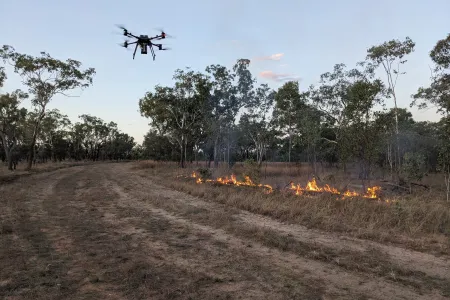Battle-ready medical drones to join Army’s ranks
A new drone delivery project led by Charles Darwin University (CDU) aims to revolutionise healthcare in modern warfare.
The project, led by the North Australia Centre for Autonomous Systems (NACAS) at CDU and supported by the Queensland Defence Science Alliance (QDSA), will focus on solving the technical, logistical and regulatory challenges of integrating large, heavy-fuel cargo drones into the battlefield operating system.
NACAS will work with Queensland uncrewed aerial systems (UAS) manufacturer SAIDYNAMICS to adapt their hybrid 2-stroke engine drone for long-range, cold-chain cargo operations.
The project will also partner with Griffith University’s Centre for Enterprise Architecture Research and Management to develop navigation algorithms for drones to locate drop-off locations in GPS-degraded environments.
Visual line-of-sight trials are set to begin over the coming months in the Northern Territory, with longer beyond-visual line-of-sight trials (BLVOS) to start with regulatory approval.
NACAS Professor Hamish Campbell said the Australian government was investing heavily into sovereign capability for the manufacture of UAS, but far less attention was being paid to solving the challenges of integrating these platforms into existing operating systems and the national airspace.
Professor Campbell said the Northern Territory’s low ground infrastructure and sparse population made it an ideal location for the project’s flight trials.
“NACAS is one of the leading organisations in Australia for research into UAS airspace integration, and this will be bolstered by the opening of the new Airspace Integration Research Facility (AIR-F) later in 2025,” Professor Cambell said.
QDSA Director Stuart Blackwell said the Alliance was focused on collaborating with the best minds in the Northern Territory, Queensland, and Defense industry to solve key challenges faced by the Australian Defense Force (ADF).
“QDSA believes this particular project has real potential to solve some of the logistics distribution challenges in remote locations of Northern Australia that will benefit Defense, Queensland and the Northern Territory,” Mr Blackwell said.
CDU Deputy Vice-Chancellor Research and Community Connections Professor Steve Rogers said the University was well-placed to contribute to advancing defence capabilities.
“Australia needs to be at the forefront of defence research and innovation, and our researchers will provide strategically vital experience to these projects,” Professor Rogers said.
“Charles Darwin University became a member of the Queensland Defence Science Alliance less than a year ago and the beginning of these projects are a testament to our world-leading knowledge and capabilities.”
Northern Territory Chief Minister and Minister for Defence NT Lia Finocchiaro congratulated the grant recipients.
“This research reinforces the importance of the Northern Territory to our nation’s defence security and strategic importance in the Indo-Pacific,” Mrs Finocchiaro said.
“I look forward to showcasing the incredible capabilities of our industry at NT Defence Week in April 2025.”
Related Articles

First “hype cycle” of AI development put tech above humans
Users around the world have rushed to adopt artificial intelligence - especially in safety-critical fields - but a new study has revealed the hype has prioritised technology for technology’s sake instead of human-centred development.
Read more about First “hype cycle” of AI development put tech above humans
Nanoplastics hindering cognitive abilities of fish, international research shows
Nanoplastic exposure can impair the cognitive abilities of fish and could lead to significant impacts on marine species’ ability to survive, according to a new international study.
Read more about Nanoplastics hindering cognitive abilities of fish, international research shows
Eradication would cost billions: NT’s lessons for Pilbara’s cane toad management
Cane toads are predicted to invade Western Australia’s Pilbara region by 2041 if left unchecked, but the Northern Territory’s population of the pests hold key lessons that could save billions in eradication costs.
Read more about Eradication would cost billions: NT’s lessons for Pilbara’s cane toad management
